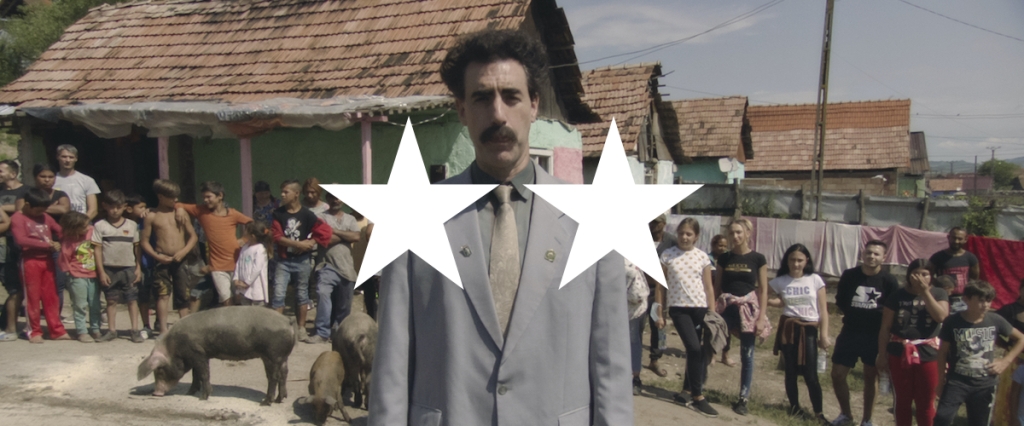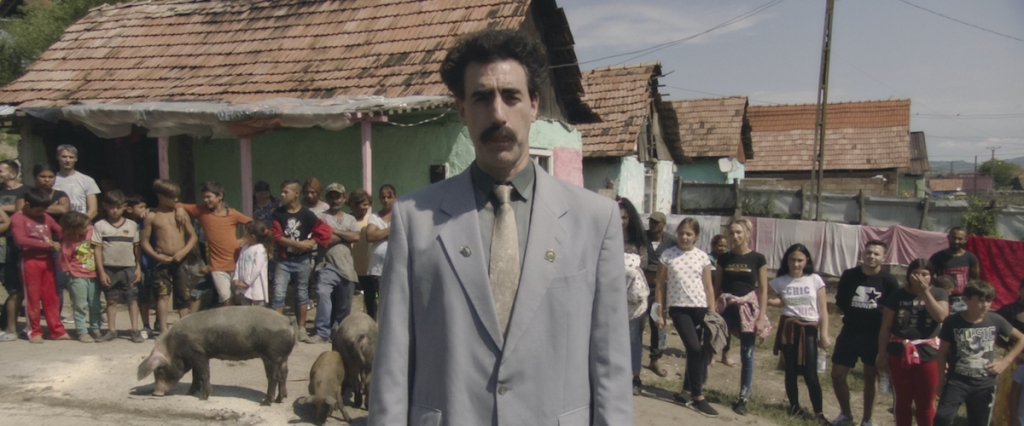Sacha Baron Cohen picked the wrong time to start caring. More than anything else it is astounding how Borat: Subsequent Moviefilm plays out like an apology for the original. While it pretends at being a cutting satire of the current American political moment, it is entirely unable to escape its own shadow.
I’m old enough to vaguely remember the criticisms back in 2006, though I can’t fully say to what extent they were levelled in good faith. Mostly concern felt levelled at the representation of Kazakhstan (and Romania, the filming location), the persona of Borat himself, and the fear of that there could be people out there — always less perceptive than the commentator — who would take what they were seeing at face value.
What we get in response is one and a half hours of softening. A movie that outlines its intent, underlines its conflict, and invites the audience always to question the magic trick that perpetuates its heart: how did this get filmed?
There’s something formulaic about how we enter each scene. Rarely are we presented with a stage for some steadily evolving chaos, instead everything feels neat. We get a setup (teenager stumbles into meeting of Republican women) and a punchline (she gives a speech about the joys of masturbation) and then we cut away. No shock, no outrage, just minor discomfort and an incitement to move on.
Maybe people are simply more wary around cameras then they were a decade and a half ago. Borat’s charmlessness and guilelessness once set people at ease, created avenues for them to express some kinda truth about themselves. That’s obviously no longer the case. Instead the film concerns itself with the inner truth of Borat — revealing a character who is plagued with insecurity and self doubt.
One wonders who this is for? Who really cares for Borat as a person? It feels desperately like there’s ego present, the film is bisected, Borat’s personal drama sits off to one side and Cohen’s stunts line the other during which he adopts all manner of disguises and personas. He is still Borat in these, but in name only. It’s hard to get invested when our hero feels more like a tool to be picked up and discarded whenever convenient.
It’s odd that this film has villains. The first one never did, it looked upon America with clear eyes and gave people a chance to expose themselves. This one is all attack, so flounders when its targets respond with less confrontation than they are approached with. The overwhelming sense is that society is basically fine, that those in charge are an abberation, that sexism is in general bad but mainly perpetrated by the types of older conservative white men whose ability to control power is personal and individualised.
It’s so at odds with what the world is. It believes that catching Rudy Guilani with his hands in his pants will do anything or mean anything, and thinks that the best way to respond in the moment is with a lingerie wearing man to bust down the door and cause a scene.
All of its energy is in the wrong place, it entirely lacks focus, it’s the kinda film that thinks making fun of a sugar baby is more cutting than critiquing the economic realities that make that lifestyle seem attractive.
Maybe we get the film that we deserve for the times we’re in. For all its strengths Borat feels painfully 2006, here the hindsight isn’t even necessary — it’s very 2020, just not in a good way. The funniest joke in the whole thing is at the end when it tells the audience to go vote.


Leave a comment